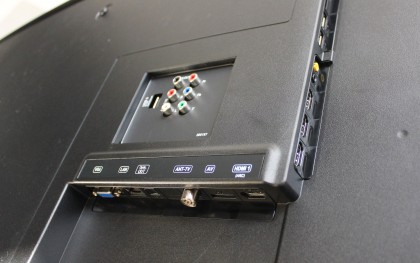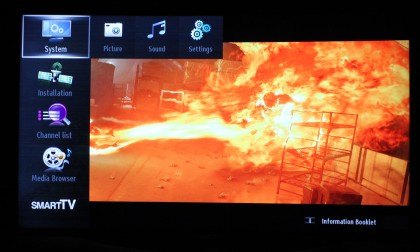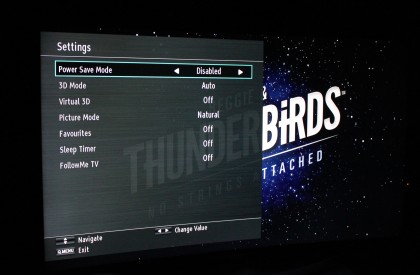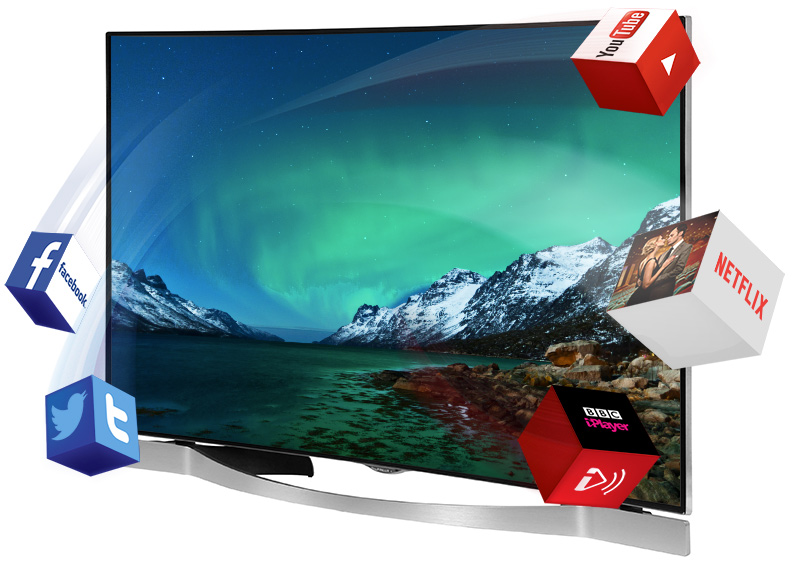TechRadar Verdict
Finlux will woo fashionistas with this cut-price curved UHD screen, but be wary of a dated Smart portal and limited spec.
Pros
- +
Vibrant colour performance
- +
Looks great with native 4K content
- +
Decent motion handling
- +
HDCP 2.2 for future 4K compatibility
Cons
- -
Images deprived of deep contrast
- -
No HEVC decoder, so no Netflix 4K
- -
Smart portal feels tired, lacks catch-up apps
- -
That curved screen is soooooooooo 2014
Why you can trust TechRadar
Decided to upgrade that Full HD fat TV for a trendy 4K job? Looking for something that won't break the bank? Then you're the buyer Finlux wants to bag.
The brand has made a name for itself serving cut-price Full HD to check-list shoppers, and now it's offering curved 4K UHD in the shape of the snappily monikered 55UT3EC320S.
This 55-inch 2160p set has a sibling flatmate, the 55UT3E242S, priced some £300 cheaper. These are the first UHD resolution sets sold by the brand, better known for its budget 1080p offerings.
Finlux has no qualms about marketing the EC320 as a cheap curved 4K telly, so just how much of a bargain is this set?
The cosmetics are nice enough. The screen has a fashionably thin bezel and seamless metallic trim. It glints appealing. However, this edge doesn't appear to be fully bonded to the rear of the set and as a result can be rather sharp to the touch in places.
The set comes with a heavyweight curved stand. This is a substantial chromed affair with the edges neatly matching the side of the panel. The stand's bow is both practical and artistic – to the rear, bolted plastic feet keep everything stable.
Connections and setup
Connectivity includes four HDMIs, three of which are side-facing. Only one of the four is HDCP 2.2 4K compliant, and that's Input One.
The remaining three failed to display an image from an HDCP 2.2 content source.
Other inputs include Ethernet LAN, an AV input for old-fashioned SCART (adaptor supplied), component video and phono stereo, a digital optical audio output for use with the obligatory soundbar, as well as a trio of USBs, one of which is a fast 3.0 variant.
Unusually there's also a PC VGA input – a bit of a rarity in this day and age.
The set has a single DVB Freeview HD tuner. There's also a subwoofer output, should you want to get a little more bass from your gogglebox.

The set ships with a standard IR zapper. There's no voice interaction or gesture control here.
It's a large-buttoned affair that offers one touch access to the Finlux Smart portal, as well as perennial favourites Netflix and YouTube. There's also a shortcut to any connected USB hard drive that might be attached to the set.
The remote control itself is actually curved, obviously to ape the screen. This may be overly cute, but there is some practical benefit: your thumb is in closer proximity to all the keys. That said, the remote does rather roll around in the hand.
The main navigation buttons also creak like stairs in a haunted house. If this controller has been intentionally designed to sound ultra-clicky the effect gets real old real fast.
Connected sources are fast to access, thanks to a simple full-screen input list provided via the uppermost button on the remote.
While top tier TV makers have invested heavily in their user interfaces - from the brilliant simplicity of LG's webOS to the one-size-fits-all app-led approach of Android - Finlux keeps things fairly utilitarian and not a little fusty.
You're guided through the tuning process and network connection with prim efficiency. The onboard Wi-Fi is dual band, so you can get connected either at 2.4GHz or 5GHz.
Navigation is straightforward. A Q.Menu mode throws up an oddball selection of settings, from a power saving Eco mode and scheduled power off, to 3D, assorted picture presets, and your channel favourites.

The main menu is distinguished by vertical graphics. System calls up the Picture and Sound settings, as well as less-used stuff like Network Settings and Parental Controls. You can also dive into the main installation menu, scan and edit the channel list or fire-up a media browser.
File support is good enough. The set will find and stream from any DLNA connected device, be it a NAS media server or PC, as well as local USB.
The set found my networked Plex and Twonky Media servers without a hitch, playing VOB files, AVIs, MKVs, MOVs, WMV, WMA, AAC and MP3s. If you've been building up a collection of FLAC music files though, you're out of luck.
Most of the picture settings offer routine adjustment, such as Contrast, Brightness, Sharpness and Colour via sliders, but the Advanced Picture menu offers some more intriguing tweaks. These include Film Mode and Movie Sense, as well as Dynamic Contrast.
The latter really boosts the picture, although not necessarily in a good way. To avoid unintentional overscan, ensure that the aspect ratio is set to Full, which is selectable from the remote handset.
No place for catch-up TV
Finlux's Smart portal grade is more Primary School rather than Secondary. There's an embedded Twitter widget, but to use this you need to log in via a separate account required by the TV.
Is it worth the effort? Probably not.
Having a Twitter feed on a TV feels a bit old school to me. Throwing social media onto a communal device isn't really reflective of the way people use social media. And yes, Facebook is here too.
It's a bit naff.
The Finlux Smart portal GUI divides between a large live TV window and an app control panel. Here you'll find BBC News and Sport, Flickr, TuneIn Radio, Viewster and DailyMotion. BBC iPlayer, Netflix and YouTube have been segregated below the main selection.
Opt to search for more apps and the live TV window is overlaid with an app store. There's quite a few packages to browse, but I seriously doubt you'll want to install any of them. The set lacks any other key catch-up TV services, so no Channel 4, Demand 5 or ITV Player.
It should be noted that the Netflix client is not 4K capable, not least because the set doesn't have an HEVC decoder. The version of Netflix here is the SDK 3.1.4 release from April 2014.

Navigation feels a little sluggish at times. Often the screen doesn't quite seem able to keep up with your remote controlling, lagging just slightly behind.
It's also curiously impatient, throwing up large No Signal dialogue boxes at the drop of a hat. Watching a Blu-ray, these would pop up even as the disc branched between menu items.
Steve has been writing about AV and home cinema since the dawn of time, or more accurately, since the glory days of VHS and Betamax. He has strong opinions on the latest TV technology, Hi-Fi and Blu-ray/media players, and likes nothing better than to crank up his ludicrously powerful home theatre system to binge-watch TV shows.

